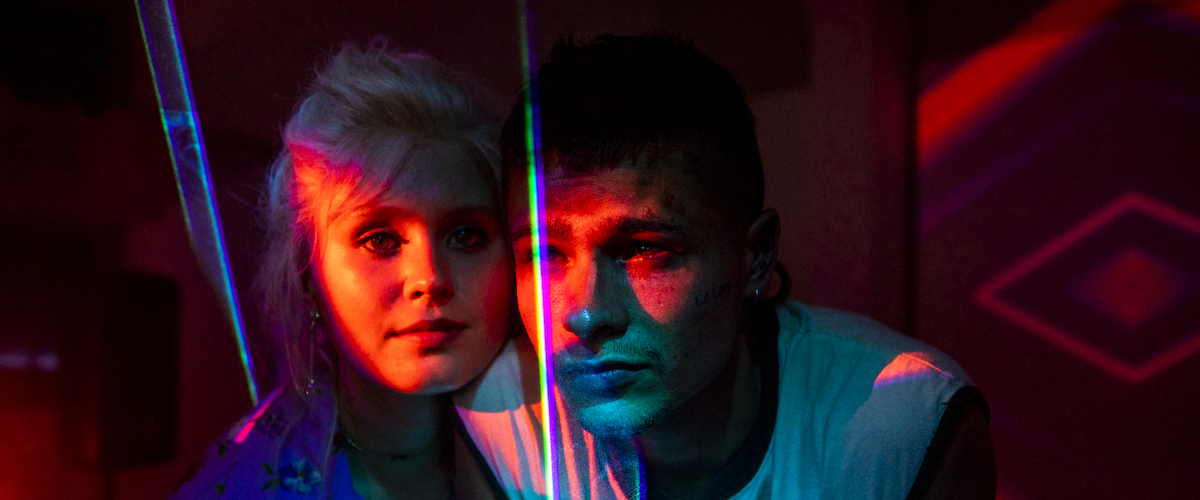Director Shannon Murphy’s pedigree precedes her. With episodes of Killing Eve, Rake, and Offspring, under her belt, there’s an understandable expectation that the quality of those shows would transfer naturally across to a feature film. With her directorial debut, Babyteeth, based on Rita Kalnejais debut script, Murphy proudly makes a statement for being another deeply assured and confident director on the Australian film landscape.
The plot is a Xerox of a Xerox of a Xerox of the rote and routine teen illness stories that have become the norm across the past decade, with Babyteeth playing like an adult, riskier version of The Fault in Our Stars or Restless or Me, Earl, and the Dying Girl. Here, Eliza Scanlen plays Milla, the mysteriously-unnamed-cancer patient, a seemingly quiet girl who quite literally has the ‘love of her life’ bump into her while she’s waiting for a train. He is Moses, Toby Wallace’s scabby and bruised drug dealing sly lothario, a vagrant man thrust onto the streets after pushing his mother too far. He sees a world of opportunity, she sees a man in control of his own destiny.
The two fall in love, much to the chagrin of Milla’s parents, Anna (Essie Davis) and Henry (Ben Mendelsohn), who try to push Moses away, all the while Milla protests. After all, she’s sixteen, and he’s twenty three. He steals and is outwardly untrustworthy, she is young and slightly naïve, the two shouldn’t fit, but because the narrative needs it, they are kept together. Henry is a therapist, and Anna is a stay at home mum needing something to fill her time with.
I’m being purposefully glib, so let’s get the positives out of the way. The performances are exemplary. Davis and Mendelsohn are titans of the Australian film industry, and as such, they tower over the film with deep layers to their characters. While it’s great to see our Mendo off in Star Wars films and ockering up the MCU, it’s even better to see him back at home, chowing down on beetroot sangas and being a true blue Aussie with that hard accent. Each moment Mendo is on screen is a moment to assess, monitor, and learn from, with a deeper understanding of the power of a performance in each frame.
Equally so, Essie Davis continues on stacking her filmography with stellar performance after stellar performance, with True History of the Kelly Gang working as the perfect flipside to her medicated mother in Babyteeth, and both accenting her monumental performance in The Babadook. If Mendo is a master who’s travelled overseas, then Davis is the genius who has flourished at home. One of the modern greats.
Eliza Scanlen takes the lead role nicely, and when paired with the masterpiece that is Greta Gerwig’s Little Women, we can clearly see that she’s a talent on the rise. Yet, it’s hard to shake the feeling that this is one of those characters that young actors need to do as their career is on the rise: the tragic teen story, bonded with familial struggles, and romantic conquests. Sure, her scenes with Toby Wallace are well performed, and carry some slight interest, but they’re so depressingly familiar. As with Scanlen, Wallace is another star on the rise, with his work here matching his outstanding performance in Acute Misfortune.
And here’s the biggest problem with Babyteeth; for the majority of its runtime, I couldn’t help my mind straying towards thinking of the great performances that these actors have given elsewhere. There’s an attempt to make this cancer-drama unique and different than the norm, with mild moments of fourth wall breaking stares, alongside title cards announcing what the next scene will be about, but it’s not enough to shake the feeling that we’ve done all of this before.
The way that cancer is presented in Babyteeth feels equally imprecise, with the specific cancer that plagues Milla’s body never actually being mentioned. This may be a purposeful choice to help distance any representation of the medical process, especially given there are precious few clinical scenes, but instead I couldn’t help but raise my eyebrow at the impact of the cancer on Milla’s life. As seen within Babyteeth, the worst of what happens to Milla is that she loses her hair and vomits every so often. It’s a difficult complaint to have, especially since it reads like I’m saying that she wasn’t ‘sick enough’, but giving the time span of the film (which takes place over the space of a month or so), it’s hard to reconcile with where we start, and where the narrative ends, and how Milla’s narrative concludes.
I wanted to love Babyteeth, the international attention and acclaim that has been lauded on it made me excited for another great Australian film, but I couldn’t help but walk out of the screening feeling like I was emotionally absent. The film does the natural thing that most weepy-dramas do – they hit you with that emotional gutpunch at the end – and in those last fifteen minutes, Babyteeth genuinely soars with emotions and humanity. But leading up to that? It’s a humdrum routine drama.
I desperately wanted to have the interest and drive to dig into the narrative of Babyteeth, but I just don’t. Everything from Mendo’s wavering therapist father, to Davis’ Zoloft-popping mother, to the druggy boyfriend, and the rebellious teen, it just feels like I could copy and paste things I’ve written about plenty of films before, and it would feel just as apt. Throw on the peripheral character threads that wrap up in an all-too-neat fashion, and you’re left feeling that this is just a little too cookie cutter-esque. As an Australian film, Babyteeth feels like the amalgamation of Angel Baby with Candy with Little Fish and My Year Without Sex, and a bunch of other depressing dramas. I’ll gladly defend any Aussie film, but I get the impression that when people talk about Australian films being too dour, this is what they’re talking about. (It’s not, there are welcome moments of levity that help keep Babyteeth from being too leaden.)
With that said, there’s a reason these kind of weepies keep getting made – audiences appreciate them, and enjoy a good cry. If that’s you, then this is right up your alley. For me, I feel I’m just a little too cynical to embrace this well acted, routinely written, and confidently directed film.
Director: Shannon Murphy
Cast: Eliza Scanlen, Ben Mendelsohn, Essie Davis
Writer: Rita Kalnejais




